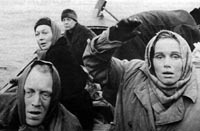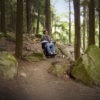
Distribution | Film Funding | Interviews | Massachusetts | New York
From Clerk to Curator: Bruce Jenkins of Harvard Film Archive
Written by Devon Damonte | Posted by: Anonymous
Bruce Jenkins, the new curator of the Harvard Film Archive, says for him, the best introduction to working in film was his summer job during school at NYU as a shipping clerk at small documentary distribution company, Icarus Films. "There," he says, "I learned the fine art of rewinding, cleaning, and strapping films into shipping cases."
He did not go from shipping clerk to curator overnight. After studying film at grad school at Northwestern in the ’70s, he became the film programmer at Media Study Buffalo in Buffalo, NY. "That was a fabulous place," he recalls, "not only because Buffalo was a very lively artistic intellectual community, but also it was a place which was absolutely committed to independent media." At this same time, he also sat on the New York State Council on the Arts film panel, one of the major funders for independent film and video during the early ’80s.
From Buffalo, he moved to the Walker Art Center in Minneapolis, which he had already collaborated with at Media Study Buffalo, on a program called the American New Wave. This was a touring film project funded by the NEA, "One hundred years ago, when it still gave money to help independent film." The project, which premiered at Sundance in 1983 and then toured U.S. museums and universities, was conceived "at the time when Jim Jarmusch and Spike Lee are making their first films, and people are talking about ‘independent features,’" Jenkins says. "And the notion was that this would be a great moment to look back at what that earlier generation–the John Cassaveteses, the Shirley Clarkes, the Mekases–at what that earlier generation of independent feature film looked like."
Since then, Jim Jarmusch and Spike Lee have become the elder statesmen of independent film, and independent features have garnered mainstream acceptance–even Academy awards. In spite of changes in the industry, collaboration and community remain foremost in Bruce Jenkins’ vision for the HFA and the Boston film community.
DD: I want to [talk about] a thread running through your history, that of collaboration within the small world of media and arts organizations. The Walker and Minneapolis groups in general are known for collaborating with other institutions, and I wonder how you see the "collaborative spirit" in regards to the Boston community.
JENKINS: It’s not that Minneapolis is years ahead of Boston; it’s simply that there seems to be a tradition in Boston, and certainly here on the Harvard campus, where the prevailing mode of operation is "every tub on its own bottom," a kind of complete commitment to autonomy. One feels that that’s not unique to Harvard. Picking up the paper and seeing what’s happening at various institutions, I realize that the entire region is operating on that principle. You come up with great projects and work hard to execute them as best as you can, without necessarily thinking about how this might impact on other institutions or, more to the point, how these programs might be bettered by or how the reception for them might be enhanced by other institutions. So the good news is that the field is wide open. I think the single most underdeveloped aspect of arts and cultural production and practice in the region is the notion of networking and of collaboration, the sense that partnering could be an extraordinarily positive virtue that could produce major results. And indeed I know firsthand that it can, and that it’s not only possible here, but I believe it’s the future of this community.
DD: When you were in Minneapolis, did you have impressions of what Boston’s film and video scene was all about?
JENKINS: It’s always individuals. What stuck out for me were people like Brodsky and Treadway, the notion that there were these geniuses of small-format media in Boston who could rescue any 8mm or Super-8mm and put it on video right; Susan Dowling, who was doing work at ‘GBH, who wanted to embrace much more strongly independent work for public television; and the work of BFVF, because I’d always gotten their mailings, and I had come out and been on the jury for the New England Film Festival, and I routinely saw their programs; and then finally the fact that there were major if not legendary nonfiction filmmakers who resided, taught, and made their work in this community. That latter part I’ve had visible to me up close in coming to the Archive and having among the very first programs a brand-new film by Fred Wiseman with Fred here, Errol Morris doing a retrospective of his work and having his "Mr. Death" film do a local premiere here, Ross McElwee being on faculty here and this semester showing his Berlin Wall film on the tenth anniversary of the fall of the Berlin Wall–to have filmmakers of that caliber, especially being in residence here. There is a film community in Minneapolis, certainly a more than decent nonfiction and experimental community, but not on par with this. Being in the company of the masters of the medium, people who have changed our understanding of what constitutes nonfiction film, that is positively thrilling.
DD: Were there any surprises for you moving to Boston?
JENKINS: That parking was really as big of a problem as people say it is. [Laughter.] I remember being at a panel for a College Art Association meeting years ago, and Gerry O’Grady [a colleague in Buffalo as well as Cambridge] introduced Nam June Paik, and Nam June–of course the visionary of video and new media, in fact–Gerry said, "Here’s the George Washington of Video Art." Nam June got up and said, "In the 20th century, the greatest problem that we have yet to address is…parking." And he might have been talking about Boston and the Cambridge area.
DD: What sort of vision do you have for Harvard Film Archive, both short-term and long-term goals?
JENKINS: The University hired as a consultant Paul Spehr about four years ago, who was at the Library of Congress for many years. Among his recommendations for the collection, which we’re just now starting to move forward with, is for the Archive to hire an actual archivist; that is, someone who comes in and starts working with the celluloid material, doing conditioning reports and evaluating its physical state, but also making recommendations for preservation. And beyond that, he suggested we join the International Federation of Film Archives (FIAF), because it’s a major force in the world of preservation which would give us access to information and films around the world.
Parallel to that, we should begin to develop our film exhibition program. You know, we run basically a seven-night-a-week cinema here. One of my big goals is to make that a little more widely known. I know when I first got here, the "Boston Globe" ran its fall campus previews, and under the profile of Harvard, it was noted that Harvard Film Archive is one of the "best kept secrets on campus," and I remember thinking this is probably not a good thing. Maybe it’s helpful if you run movies seven nights a week that people know where you’re located and that there are films going on virtually every night of the week. So the notion that we might be able to put on really rare films, films from other collections on a regular basis by joining FIAF and working towards the ends of preserving our own collection, there’s a real synergy in that.
And then I’d like the collection to grow, and I would like to see the collection grow in a way that acknowledges where it is; that it is in a community of great wealth in terms of nonfiction; that it’s in a community where a certain kind of independent practice has happened. I’ve talked about my interest in having the work from the New England Film and Video Festival entered into the collection, and work by people who have taught here in this community in the collection. Those are some long-term plans, to not only have their work represented in the collection, but to move forward in terms of preservation and in presenting that work.
Visit http://www.harvardfilmarchive.org to learn more about the HFA's upcoming series and screenings









